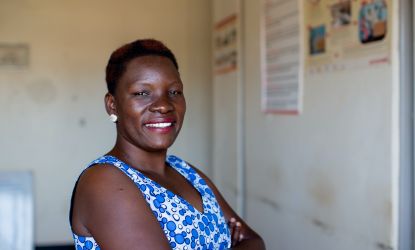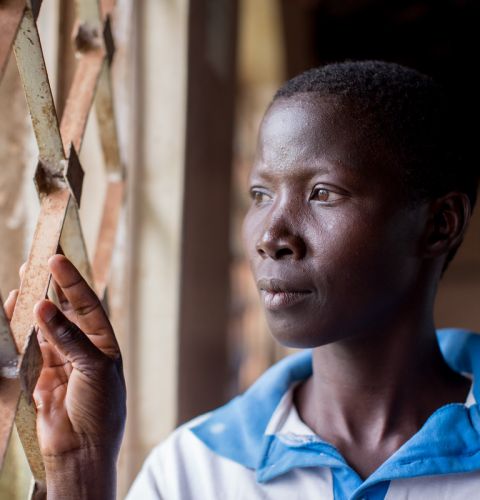Domestic violence is the most prevalent form of abuse experienced by women and girls around the world. Find out more about domestic violence and abuse, its impact, and how ActionAid is working to end violence and support survivors.
What is domestic violence and abuse?
Domestic violence refers to physical, sexual or emotional abuse and controlling behaviours, usually by a current or former partner, but also by a family member or carer.
Domestic violence is rarely a one-off occurrence. A survivor usually experiences many different forms of violence during one incident. Violent acts are often repeated throughout and sometimes after the relationship.
Although domestic violence does affect men, statistics show that it is overwhelmingly carried out by men and experienced by women.
This is why, as an international charity, ActionAid works with men, women, girls and boys in communities around the world to prevent domestic violence - and support survivors when violence occurs.
What ActionAid does to end domestic violence and abuse
ActionAid is an international charity working across Africa, Asia and Latin America to end domestic violence.
Through local women's groups and girls' clubs, we empower women and girls to know their rights – especially their right to make choices about their own bodies.
By funding local women's organisations, we help provide vital information and support services like women's shelters for survivors of domestic violence. We support organisations who investigate domestic violence cases and take perpetrators to court to ensure they are brought to justice.
We work to end harmful traditional practices such as child marriage that create relationship power imbalances where domestic violence is common.
ActionAid also campaigns at a regional, national and international levels to end all forms of violence against women and girls.

Supporting survivors at women's shelters in India
Every 15 minutes, a woman or girl is raped in India.
That's why ActionAid runs a One-Stop Crisis Centre in Madhya Pradesh: a centre which provides temporary shelter as well as medical, legal and counselling services for women and girls who have experienced violence.
Jyoti, a survivor of domestic abuse herself, now works as the crisis centre. She has provided counselling for 300 girls in eight months.
For me the most important thing is to fight for women and their rights and if I'm doing that continuously I think I'm doing what I want to do. I'm standing with ActionAid and ActionAid is standing with me."
Jyoti, is a survivor of domestic violence. She now works as a counsellor at the One-Stop Crisis Centre in Bhopal, India, providing support for women and girls.
Smita Sharma/ActionAid
The impact of domestic violence and abuse
Domestic violence has devastating consequences for women and girls.
Women who have been physically or sexually abused by their partners are more than twice as likely to have an abortion, almost twice as likely to experience depression and, in some regions, 1.5 times more likely to acquire a sexually transmitted infection (STI) or HIV.3
Other physical and mental impacts of domestic violence include injury, chronic pain, suicide, post-traumatic stress disorder, neurological disorders, anxiety, alcohol and substance abuse, and death.
How domestic violence affects women and girls living in poverty
Domestic violence is a global problem, but women and girls in poverty are even more at risk. Survivors often can’t afford to go to hospital or get support from the police, and are left dealing with the emotional and physical impacts of the abuse on their own.
That's why ActionAid is committed to ending domestic and other forms of violence against women and girls. Our local workers tackle violence in their communities and help survivors access the services they need and the justice they deserve.

Alice is a Psychological Support Officer at an ActionAid women's shelter in Gulu
Karin Schermbrucker/ActionAid
Preventing domestic abuse in Uganda
Alice, 31, works at an ActionAid women's shelter in Uganda, which provides a range of services for survivors of domestic abuse.
She provides psychological support to women who arrive at the shelter; she also carries out preventative work in the community, including teaching women and girls about their rights, putting on radio talk shows and liaising with community leaders.
"Any woman in this society has been in one way or another faced with violence because we live in a patriarchal society," she says.
Generally in the culture that I live in, that I grew up in, women are seen as property to men and this is the ideology that I want to change."
Alice says she is proud to now have a job where she can help to teach girls that they are not worth less than boys.
Have you been affected by domestic violence?
If you or anyone you know has experienced violence, there are services that can help. You don't have to report the assault to police if you don't want to.
These services may be able to help you:
24-hour National Domestic Violence Helpline - 0808 2000 247
A 24-hour national service for women experiencing domestic violence, as well as for their their family, friends, colleagues and others calling on their behalf.
Rape Crisis – 0808 802 9999
A free national helpline for women and girls who have experienced abuse, rape and all forms of sexual violence.
Galop, the LGBT+ anti-violence charity
Support for LGTB+ women, men and non-binary people who have experienced hate crime, sexual violence or domestic abuse. They also have a dedicated service for trans people.
The Survivors Trust
Support for all survivors of rape, sexual violence and childhood sexual abuse, no matter how long ago it happened.
Childline - 0800 1111
Free help and advice to anyone under the age of 19.
Footnotes
- 1World Health Organisation, Violence against women, intimate partner and sexual violence against women: http://www.who.int/mediacentre/factsheets/fs239/en/
- 4https://www.unodc.org/documents/gsh/pdfs/2014_GLOBAL_HOMICIDE_BOOK_web.pdf
- 2ActionAid (2016) Fearless: Fearless women and girls leading the way, transforming lives: https://www.actionaid.org.uk/sites/default/files/publications/fearless_women_and_girls_- _leading_the_way_transforming_lives.pdf/
- 3http://www.who.int/news-room/fact-sheets/detail/violence-against-women
Page updated 25 July 2024
